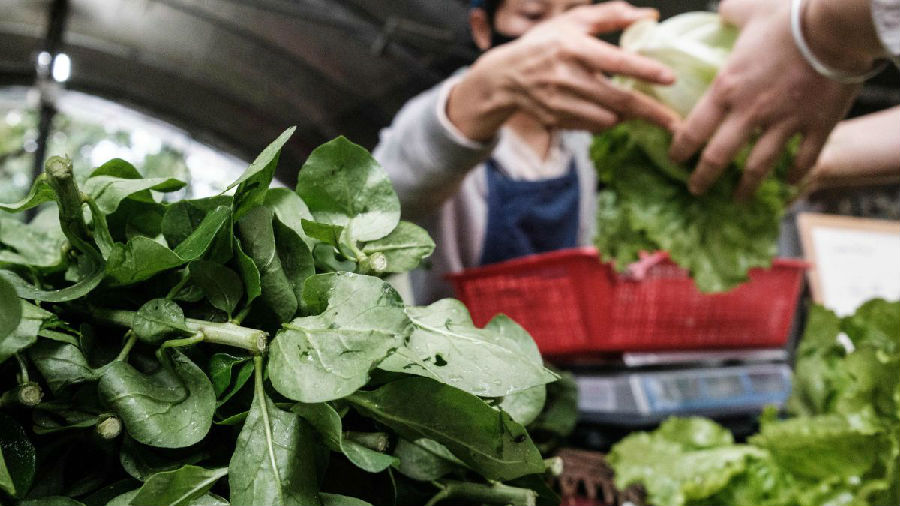Pandemic could trigger a food crisis
聯合國警告全球大饑荒
Cooking has become a hobby and major recreation for many people in quarantine during the COVID-19 pandemic. It's almost impossible nowadays to check social media without at least two or three photos of delicious meals popping up on our screens. But behind the fancy recipes and boastful social media posts, many of us don't realize how much we take food for granted.
新冠肺炎疫情居家隔離期間,烹飪成了不少人的愛好和一大娛樂方式。如今打開社交媒體,屏幕上幾乎都會出現至少兩三張美食的照片。但在這些精致食譜和社交媒體曬照的背后,許多人都沒有意識到我們將擁有食物看得太過理所當然。
"At the same time while dealing with a COVID-19 pandemic, we are also on the brink of a hunger pandemic," David Beasley, executive director of the World Food Program (WFP), a United Nations agency, warned on April 20.
“在應對新冠肺炎疫情的同時,我們也正處于大饑荒的邊緣,”聯合國世界糧食計劃署執行干事戴維·比斯利在4月20日如此警告。
Around 135 million people had been facing food shortages before the coronavirus outbreak, but now 130 million more could go hungry in 2020, said Arif Husain, chief economist at the World Food Program. Altogether, 265 million people are being pushed to the brink of starvation by the COVID-19 crisis.
全球在疫情暴發之前已有1.35億人口面臨糧食危機,如今這一數據在2020年將增加大約1.3億,世界糧食計劃署首席經濟學家阿里夫·侯賽因表示。總體而言,共有2.65億人將由于新冠肺炎危機面臨饑餓。
According to The New York Times, thousands of workers in India are lining up twice a day for bread and fried vegetables to fight against hunger. And across Colombia, poor families are hanging red clothing and flags from their windows to show that they are hungry.
據《紐約時報》報道,印度數千名工人一天排兩次隊領取面包和炒菜以應對饑餓問題。而在哥倫比亞各地,貧困家庭都在自家窗口掛上了紅布和旗子,表明他們正在餓肚子。

"We don't have any money, and now we need to survive," said Pauline Karushi, who lost her job at a jewelry store in Nairobi. "That means not eating much."
“我們沒有一點錢了,現在我們要活下去,”寶琳·卡魯什在失去了她在內羅畢一家珠寶店的工作之后如此說道。“這意味著不能吃多少東西。”
Lockdowns and social distancing measures contributed to loss of income for people worldwide and disrupted agricultural production and supply routes, leaving millions to worry how they will get enough to eat.
封城和保持社交距離的措施令世界各地的人們收入減少,并打亂了農業生產和供應路線,數百萬人都對自己是否能夠獲得足夠的食物而感到擔憂。
Money alone will not be enough, according to WFP. Also crucial is ensuring that transport and supply chains stay open in the face of lockdowns.
世界糧食計劃署認為,僅僅有錢是不夠的。同樣重要的是,要確保交通和供應鏈在封城期間保持運轉。
"There is no shortage of food globally – yet. But problems in planting, harvesting and transporting food will leave less developed countries facing even more difficult times in the coming months, especially those reliant on imports," Johan Swinnen, director general of the International Food Policy Research Institute in Washington told The New York Times.
“現在全球還沒有出現食物短缺。但在種植、收割以及運輸食物方面的問題會令較不發達的國家在未來的幾個月內面臨更困難的時期,尤其是那些依賴進口的國家,”華盛頓國際食物政策研究所所長約翰·斯威寧在接受《紐約時報》采訪時如此表示。
However, for us, there's no need for stockpiling food, said Wei Baigang, an official from the Ministry of Agriculture and Rural Affairs. The reserves of rice and wheat in China are enough for the whole population for one year, according to Xinhua, and the prices remain stable.
但對我們而言,沒有必要囤積糧食,農業農村部官員魏百剛表示。據新華社報道,我國小麥和稻谷庫存大體相當于全國人民一年的消費量,并且價格保持穩定。
"We have the confidence and determination to keep our rice bowls full," said Pan Wenbo, another official from the ministry.
“我們有信心決心端牢中國人飯碗,”農業農村部官員潘文博如此表示。



